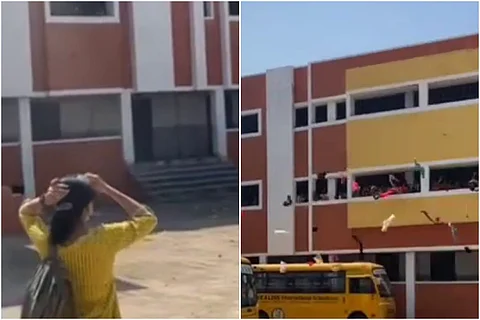

As Geeta Ilangovan, the author of a collection of feminist essays titled Dupatta Podunga Thozhi ('Wear a dupatta, girlfriend') arrived at the venue of a three-day workshop for female students of tribal schools in Tamil Nadu, scores of dupattas went flying out of classroom corridors. It was a gesture to show how much the students resonated with Geeta’s essay on women’s relationship with their own bodies, bodily autonomy, and the imposition of a garment to cover breasts instead of leaving it to the girls’ choice.
Over 150 girls from various Government Tribal Residential schools in Tamil Nadu’s Kallakurichi district gathered at the district headquarters last week for the workshop that discussed subjects like sexuality education, feminism, and agency. It was on March 12, the second day of the workshop themed ‘Empower Her/Avaladhigaram,’ that the powerful visual from the camp was shared on social media.
The sessions were organised as part of a programme aimed at bringing down school dropout rates and child marriages among tribal girls from the Kalvarayan Hills. The video, which went viral, has reignited familiar discussions on women’s choice, and their right to cover themselves and dress how they please. While the conversations continue, Tamil writer Geeta along with Nivedita Louis, the publisher of her book, and the organisers of the workshop told TNM that the students participated in the act of their own will, almost risking censure from school authorities and their families.
Sandhiyan Thilagavathy, the founder of AWARE India, an NGO working with the Kallakurichi district administration to implement a sexuality education and life skills programme in government tribal residential schools, explains that prior to this workshop, his team has been regularly visiting the students of 11 schools since November. They have conducted sessions on subjects including body positivity, self-esteem, peer pressure, relationships, gender identity, sexual and reproductive rights, and mental health.
It was on the first night of the three-day workshop when the students were seated around a campfire with writer and publisher Nivedita Louis, that she initiated the conversation on clothing. “I asked them what they felt was the most constricting dress. They said that from the moment they attained puberty, they are told to cover their breasts and wear a dupatta, which they didn’t like,” says Nivedita. As they agreed with Geeta’s essay, Nivedita suggested half-seriously that they could get rid of their dupattas to show their appreciation for her essay when the writer arrived the next day. “I didn't think that they would actually do it. It happened spontaneously,” says Nivedita.
Sandhiyan says that the girls risked backlash from their teachers to go ahead with the act, and proceeded without any coercion from adults. After the video was shot, the girls went downstairs to pick up their dupattas and according to Sandhiyan, some of them decided to leave theirs in the classroom and attend the day’s session without wearing them. While some were vocal about rejecting it, some students chose to wear it immediately after the video was shot, he says, either because they were worried about consequences, or because they felt more comfortable wearing one.
Geeta, who is also an independent filmmaker, was delighted by the gesture. She recalls that some students insisted they didn’t want to wear a dupatta at least for that one day, to exercise their agency. “Some children were wearing dupattas because we told them it is up to them to decide. It’s just not the duty of others to tell them what to wear or what not to wear,” she says.
Nivedita acknowledges some of the criticism directed towards the video, including the argument that women from oppressed communities had strived hard for the right to cover their upper bodies. “There are different perspectives and arguments against this video, but there are also people supporting it, saying that covering up is a woman's choice, whether with a burqa or a dupatta,” she says.
Talking about her essay collection, Geeta says it was partly intended to be an introduction to feminist ideas for adolescents. “The first essay, (‘Dupatta Podunga Thozhi’), discusses the shame women feel about their bodies due to social conditioning. I wanted to tell them to be proud of their body, and understand that it’s a tool to work and express themselves, their intelligence, and courage,” says Geeta, adding that the book also urges youngsters to understand the work of Periyar and Ambedkar in order to understand life itself.
Sandhiyan says the students read many other texts at the workshop, some of them published by Her Stories, a Tamil feminist publishing house run by Nivedita. Movies and web series such as Jaya Jaya Jaya Jaya Hey, Gargi, Ponmagal Vandhal, and Ayali were also screened to propel the conversations initiated in AWARE India’s earlier sessions.
“In other parts of the state, we usually partner with parents and teachers to help us better communicate sensitive topics to young girls,” Sandhiyan says. However, in the tribal residential schools, with parents and other members of the community remaining largely inaccessible, libraries were set up with books that could help adolescents navigate difficult experiences.
Geeta and Nivedita both say that while they were initially unsure if the students had read the texts, they soon learned that many of the writings had struck a chord with them. Geeta says the students talked about patriarchy, restrictions on the way they dress, their education and ambitions, romantic relationships, having multiple partners before marrying someone, monogamy as a norm, the choice to be child-free, and many other topics that they read up on and found relatable.
“Due to familial and peer pressure, there is a high risk of the students dropping out and having to get married. This is exacerbated by poverty, and the pandemic too. We discussed the importance of withstanding all kinds of pressure to focus on education and financial independence,” says Geeta.